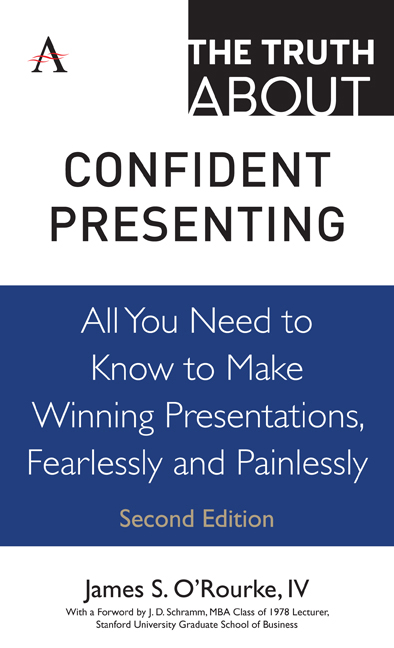 The Truth about Confident Presenting
The Truth about Confident Presenting Book contents
- Frontmatter
- Contents
- Foreword
- Introduction
- Part I Some Initial Truths
- Truth 1 Public speaking is not easy, but it's certainly doable
- Truth 2 The key to success is preparation
- Truth 3 Rehearsal is essential
- Truth 4 Emulating good speakers makes you better
- Truth 5 Establish goals for your presentation
- Truth 6 A presentation is a learning occasion
- Part II The Truth About Getting Ready to Speak
- Part III The Truth About What Makes People Listen
- Part IV The Truth About Developing Support for Your Presentation
- Part V The Truth About Getting Up to Speak
- Part VI The Truth About Managing Anxiety
- Part VII The Truth About Nonverbal Communication
- Part VIII The Truth About Visual Aids
- Part IX The Truth About Handling an Audience
- Part X The Truth About What Makes a Presentation Work
- References
- Acknowledgments
- About the Author
Truth 1 - Public speaking is not easy, but it's certainly doable
from Part I - Some Initial Truths
- Frontmatter
- Contents
- Foreword
- Introduction
- Part I Some Initial Truths
- Truth 1 Public speaking is not easy, but it's certainly doable
- Truth 2 The key to success is preparation
- Truth 3 Rehearsal is essential
- Truth 4 Emulating good speakers makes you better
- Truth 5 Establish goals for your presentation
- Truth 6 A presentation is a learning occasion
- Part II The Truth About Getting Ready to Speak
- Part III The Truth About What Makes People Listen
- Part IV The Truth About Developing Support for Your Presentation
- Part V The Truth About Getting Up to Speak
- Part VI The Truth About Managing Anxiety
- Part VII The Truth About Nonverbal Communication
- Part VIII The Truth About Visual Aids
- Part IX The Truth About Handling an Audience
- Part X The Truth About What Makes a Presentation Work
- References
- Acknowledgments
- About the Author
Summary
If you've ever had to make a presentation, you know the anxiety that comes with speaking in public. Even experienced speakers can feel flustered, sweaty, anxious and apprehensive. That's a perfectly natural reaction to a threatening situation. And when you know you're being evaluated, you feel even more threatened. Your perception of a threat causes you to release adrenal fluids, dilate your pupils, tense your muscles, and provokes a “fight or flight” response. You understand the consequences of not doing well, of failing to impress an audience or not coming through for a client when it really matters. You know all too well what can go wrong.
Good public speakers tend to focus on what can go right. They concentrate on the positive aspects of their message and how it can benefit their audience. Once they detect a positive response from their listeners, that perception serves to reinforce a sense of self-confidence, reassurance and belief that they can do this.
The fact is, public speaking is a learned skill. It's not something you're born with or that comes naturally. You're certainly born with the propensity to speak and gesture, but given the short range of the human voice, those skills are clearly intended for interpersonal or small-group settings. Speaking to a larger audience is a skill that must be learned, rehearsed and reinforced through repeated opportunities.
Keep this in mind: Very few small children are great public speakers. So how do young managers (and others) get to be so good at presenting complex information to an audience that has little interest or motivation in learning? More to the point, how do they get the audience to act on the message being shared? The answer, in part, lies in the response to the classic New York pedestrian's question, “How do I get to Carnegie Hall?” The response? “Practice, practice, practice.”
People with very little natural ability as a child have become 1 exceptional public speakers by the time they reach their twenties and thirties. Great orators, politicians and business leaders develop professional speaking skills by analyzing both their audience and their purpose for speaking. They prepare meticulously and seek out opportunities to present; then they learn what is effective from the audiences’ feedback.
- Type
- Chapter
- Information
- The Truth about Confident PresentingAll You Need To Know To Make Winning Presentations, Fearlessly And Painlessly, pp. 1 - 4Publisher: Anthem PressPrint publication year: 2019


